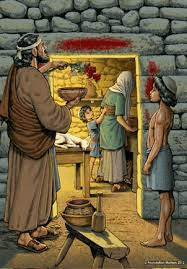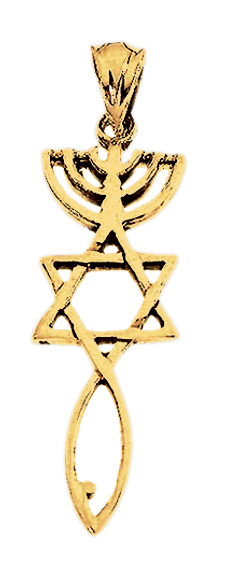Passover Faith

By Sam Nadler
The classic portion on the subject of faith is found in Hebrews 11, and it provides extensive teaching regarding saving faith. Beginning with Abel and spanning throughout Biblical history we find that these heroes anticipated Messiah’s coming through various demonstrations of faith in their lives. Moses, likewise, was looking to the salvation that would be provided in Messiah. He demonstrated his faith through keeping the Passover while still in Egyptian bondage. We, too, can glean spiritual principles which are evidenced in the Passover that is kept by faith.
By faith, he [Moses] kept the Passover and the sprinkling of blood, so that the destroyer of the firstborn would not touch the firstborn of Israel. (Hebrews 11:28)
The word kept (make or do) is in the certain tense, which means that when Moses kept the Passover, it had permanent redemptive results.
In 1 Corinthians 5:8, Paul teaches this concept to a mostly non-Jewish congregation, “Therefore, let us keep the feast, not with old leaven, neither with the leaven of malice and wickedness; but with the unleavened bread of sincerity and truth.”
Paul teaches us that “Messiah our Passover [Lamb] has been sacrificed” and we are to testify to this truth each time we celebrate the Passover, which is God’s ongoing testimony of redemption in Messiah. Because of our Moses-like-faith, we too look to Yeshua, the Lamb of God.
As Moses pointed to the greater prophet, Messiah (Deut. 18:15-19), the Passover also points us to a greater redemption. In Hebrews 11:24-26 we learn that Moses refused the pleasures of Egypt for the reproaches of Messiah because by faith he sought the heavenly reward.
Because Messiah is the Passover Lamb, keeping the Passover has eternal results. Today, we keep Passover by faith not only to remember the redemption from physical slavery in Egypt, but more importantly, we testify that this same God also redeemed us from spiritual slavery to sin, and that daily faith Yeshua’s sacrifice gives ongoing victory over our flesh. And so, Passover is the ongoing testimony to the glory of God of Messiah’s empowerment, through Whom we can do everything we’re called to achieve.
“When I see the blood, I will pass over you” (Ex 12:13)
The blood was a necessary element in order to bring redemption. Therefore, “Moses kept the Passover and the sprinkling of blood,” which points to two essential aspects of redemption regarding the blood: it’s gracious provision and as our focus of faith.
First, the blood of the lamb on the doorposts points us toward the bloody sacrifice of Messiah as the Lamb of God for Israel and the world (John 1:29; 3:16). The blood sacrifice was God’s gracious provision as a substitute for sinners who deserved His judgement. So, Leviticus 17:11 declares, “the life of the flesh is in the blood, and I have given it to you on the altar to make atonement for your souls; for it is the blood by reason of the life that makes atonement.”
The first Passover only had effectiveness because the blood was applied to the doors of the homes. The blood on the outside of the door was seen by God as their testimony of faith in His way of salvation (Exodus 12:7,13). Let me be clear, the blood of the spotless lamb on their doors like the shed blood of Yeshua’s sacrifice, was essential for it was the only means that the God of Israel provided for salvation, both then and now.
Secured by Faith in the Blood
Hebrews 11:28 continues to explain the clear purpose for keeping Passover by applying the blood, “so that the destroyer would not touch the firstborn.” The blood would protect and secure the Israelites from God’s judgement on Egypt. In the Scripture, the usage of the word “firstborn” is applied to Israel as God’s firstborn of the nations (Exodus 4:22), with future rulership under Messiah.
The judgment on the Egyptians was certain because God declared that what the Egyptians had done to Israel, His firstborn of the nations, would be done to the firstborn of Egypt (Exodus 4:22-23). What you sow, you reap. One might ask, why did Israel need to apply the blood of the lamb, since Israel was His firstborn and since God already declared His judgment upon Egypt? Understand, that the first Passover was redemption by faith, not merely physical deliverance from Egyptian bondage. This faith in God’s word was demonstrated when Hebrew households actually applied the blood on their door. If they refused to put the blood on the door, even though they were Hebrews and the firstborn, they would have been condemned along with Egyptians. If all the lambs of Egypt was slain but the blood was not applied in faith, there would have no redemption. In the same way, the facts that Messiah shed His blood for our sins would do us no good unless we trust in that blood for our salvation.
Furthermore, the author of Hebrews gives more insight when he writes, “the destroyer of the firstborn would not touch the firstborn of Israel” (Heb 11:28). The destroyer had the authority to “touch” (i.e., kill) those who had not applied the blood on their door, but had no authority to “touch” those under the blood.
Likewise, in Messiah, the true “Firstborn” ruler (Col 1:15), we are His firstborn (Heb 12:23), and we’re delivered by faith in the Lamb of God’s blood from the wrath to come (1 Thes 5:9). Moreover, we enjoy daily victory as we trust in Messiah, our Victor over sin and death. Let us all keep the Passover Feast with deeper appreciation for the Lamb of God. And please pray for the Word of Messiah staff as we proclaim the Good News of the Lamb of God in numerous outreaches throughout the US.




Add Comment